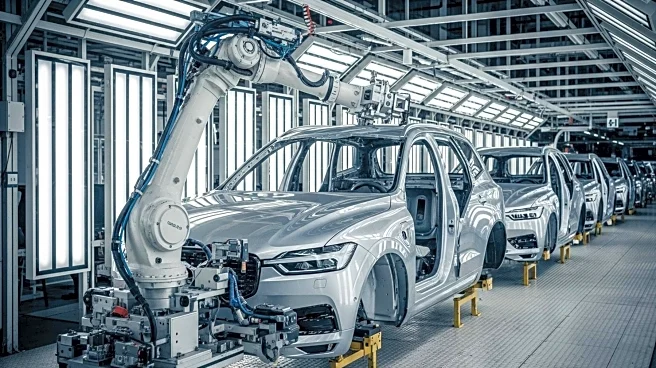What is the story about?
What's Happening?
Volvo has announced an expansion of its manufacturing plant near Charleston, South Carolina, which will now include the production of the Volvo XC60. The plant, which opened in 2015, has been Volvo's first in the U.S. and has exclusively produced the fully electric EX90 and Polestar 3. The expansion is part of Volvo's strategy to optimize logistics, reduce emissions, and repurpose existing factory space. The company plans to introduce a next-generation hybrid vehicle by 2030, further enhancing its commitment to electric and hybrid vehicle production. Volvo's CEO, Håkan Samuelsson, emphasized the hybrid's electric-first design, which will operate primarily as an electric vehicle with a backup engine.
Why It's Important?
The expansion of Volvo's Charleston plant is a significant development in the U.S. automotive industry, reflecting the growing demand for electric and hybrid vehicles. By producing the XC60 domestically, Volvo aims to reduce logistics costs and emissions, aligning with broader environmental goals. This move also highlights Volvo's commitment to the U.S. market and its strategy to meet regional consumer demands. The introduction of a next-generation hybrid vehicle underscores the industry's shift towards sustainable transportation solutions, which could influence other manufacturers to accelerate their electric vehicle initiatives.
What's Next?
Volvo's expansion may lead to increased production capacity and job creation at the Charleston plant. The company's focus on electric and hybrid vehicles could drive further innovation in the automotive sector, encouraging competitors to enhance their own sustainable offerings. As Volvo prepares to unveil its next fully electric model, the EX60, in January 2026, the industry will be watching closely for new technological advancements and design features that could set new standards for electric vehicles.
Beyond the Headlines
Volvo's commitment to electric and hybrid vehicles reflects broader environmental and regulatory pressures to reduce carbon emissions. The company's strategy may contribute to long-term shifts in consumer preferences towards more sustainable transportation options. Additionally, the expansion of domestic production capabilities could strengthen the U.S. automotive industry's resilience against global supply chain disruptions.















